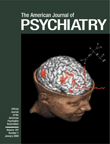To the Editor: Gabapentin is approved as an anticonvulsant and has also been used to treat chronic pain, restless legs syndrome, bipolar disorder, anxiety disorders
(1), and alcohol withdrawal
(2). Gabapentin has no known abuse potential, has few side effects, does not require blood monitoring, and does not affect liver metabolism or the excretion of other medications
(3). The mechanism of action for gabapentin is unknown. It may influence the synthesis of γ-aminobutyric acid and glutamate
(4). These systems are known to modulate anxiety, arousal, and sleep. Gabapentin may also increase deep sleep (stages 3 and 4) by increasing serotonin levels
(4). Alcohol-dependent patients commonly complain of insomnia during early recovery, and sleep disturbance has been associated with relapse in alcoholics who are recently abstinent
(5).
We used gabapentin to treat 15 of 17 consecutively evaluated alcoholic outpatients who had persistent insomnia despite 4 weeks of abstinence. All patients signed a consent statement (per the Michigan mental health code) before receiving psychotropic medication. One patient discontinued gabapentin treatment after one dose, and another patient refused treatment. The remaining patients included 12 men and three women (aged 24–45 years). Seven patients also abused marijuana, cocaine, or opiates; six had stabilized bipolar disorder, major depression, schizophrenia, or sleep apnea. Their dose of gabapentin was titrated to overall sleep response (mean=953 mg/day, range=200–1500) within 2 weeks. Most patients started to improve with 600 mg at bedtime. While seven patients required a dose of 900–1200 mg/day at bedtime to optimize their sleep quality, one responded to 200 mg/day at bedtime. Three patients took 1500 mg/day in divided doses to maximize sleep quality and reduce daytime anxiety. Neither serious side effects nor tolerance was reported.
All patients remained totally abstinent after 4–6 weeks of follow-up, except two patients who had four or more drinks on one occasion each. Each patient showed improvement on the Sleep Patterns Questionnaire
(6), a self-administered measure of insomnia, over the past month; their scores ranged from 0 to 20. Scores on the Sleep Patterns Questionnaire decreased from a mean of 15.9 (SD=2.8) before treatment with gabapentin to 5.9 (SD=3.3) after 4–6 weeks of gabapentin treatment (paired t test: t=–11.05, df=14, p<0.001).
Although our study was limited by small group size, the lack of a control group, short-term outcomes, and the lack of polysomnography, we conclude that gabapentin shows promise as a safe and effective treatment for alcohol-dependent patients with comorbid insomnia during early recovery. Controlled studies are warranted to confirm these preliminary observations.

